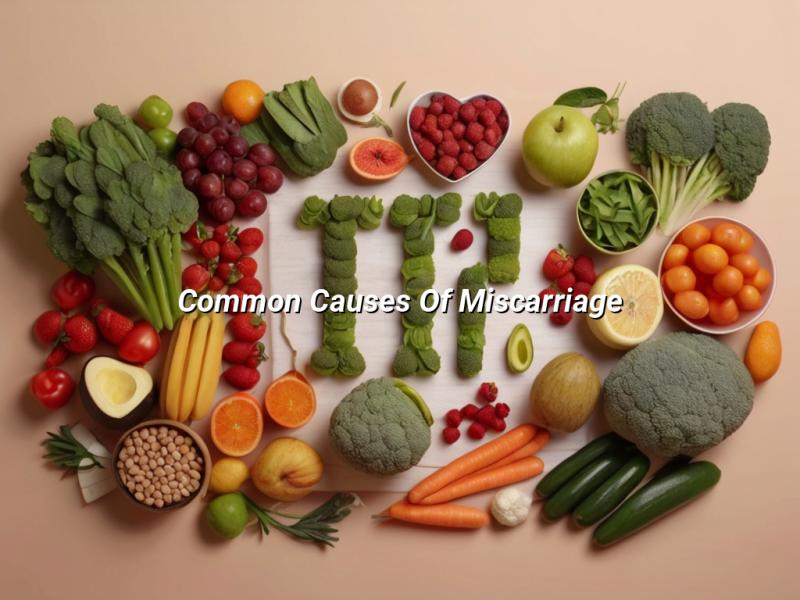Common Causes Of Miscarriage

Understanding the Risk Factors for Miscarriage
If you’re pregnant, you’re likely feeling a mix of emotions. You’re probably excited to welcome a new life into the world, but you’re also likely feeling a bit anxious. After all, pregnancy can be a roller coaster of emotions. One of the most common worries is the risk of miscarriage.
Miscarriage is a heartbreaking experience, and it’s important to understand the risk factors associated with it. While it’s impossible to completely eliminate the risk of miscarriage, understanding the risk factors can help you make informed decisions about your pregnancy.
Age is one of the most significant risk factors for miscarriage. Women over the age of 35 are more likely to experience a miscarriage than younger women. This is because the quality of a woman’s eggs decreases with age.
Another risk factor is a history of miscarriage. If you’ve had a miscarriage in the past, you’re more likely to experience one in the future.
Certain medical conditions can also increase the risk of miscarriage. These include diabetes, thyroid disorders, and certain infections. If you have any of these conditions, it’s important to talk to your doctor about how to manage them during pregnancy.
Lifestyle factors can also increase the risk of miscarriage. Smoking, drinking alcohol, and using recreational drugs can all increase the risk. It’s important to avoid these substances during pregnancy.
Finally, certain environmental factors can increase the risk of miscarriage. Exposure to certain chemicals, such as pesticides and solvents, can increase the risk. It’s important to limit your exposure to these substances during pregnancy.
Miscarriage is a heartbreaking experience, but understanding the risk factors can help you make informed decisions about your pregnancy. If you’re concerned about the risk of miscarriage, talk to your doctor about ways to reduce your risk.
Exploring the Role of Genetics in Miscarriage
Miscarriage is a heartbreaking experience for many couples, and it can be difficult to understand why it happens. While there are many potential causes of miscarriage, recent research has suggested that genetics may play a role. In this blog post, we’ll explore the role of genetics in miscarriage and what it could mean for couples who have experienced it.
First, it’s important to understand what genetics is and how it can affect pregnancy. Genetics is the study of how traits are passed down from parents to their children. It’s the science of heredity, and it can influence everything from physical characteristics to health conditions. When it comes to pregnancy, genetics can affect the development of the fetus and the likelihood of a successful pregnancy.
Recent research has suggested that genetics may be a factor in some cases of miscarriage. Studies have found that certain genetic mutations can increase the risk of miscarriage. For example, some mutations in the genes that control the development of the placenta can increase the risk of miscarriage. Other genetic mutations can affect the development of the fetus, leading to miscarriage.
It’s important to note that genetics is not the only factor that can lead to miscarriage. Other factors, such as age, lifestyle, and medical conditions, can also increase the risk of miscarriage. However, understanding the role of genetics in miscarriage can help couples better understand their risk and make informed decisions about their reproductive health.
If you’ve experienced a miscarriage, it’s important to talk to your doctor about your risk factors. Your doctor can help you understand the role of genetics in your miscarriage and provide advice on how to reduce your risk in the future. They may also recommend genetic testing to determine if there are any genetic mutations that could be contributing to your risk.
Ultimately, understanding the role of genetics in miscarriage can help couples make informed decisions about their reproductive health. While genetics is not the only factor that can lead to miscarriage, it’s important to be aware of the potential role it can play. If you’ve experienced a miscarriage, talk to your doctor about your risk factors and consider genetic testing to better understand your risk.
Examining the Impact of Stress on Miscarriage
When it comes to pregnancy, stress can be a major factor in the outcome. Unfortunately, it can also lead to miscarriage. In this blog post, we’ll take a look at the impact of stress on miscarriage and what you can do to reduce your risk.
First, let’s look at the research. Studies have found that stress can increase the risk of miscarriage. This is because stress can cause hormonal imbalances that can lead to a decrease in progesterone, which is essential for a healthy pregnancy. Additionally, stress can cause physical changes in the body, such as increased blood pressure and heart rate, which can also lead to miscarriage.
So, what can you do to reduce your risk of miscarriage due to stress? The most important thing is to take care of yourself. Make sure you’re getting enough rest, eating a healthy diet, and exercising regularly. Additionally, try to find ways to manage your stress, such as yoga, meditation, or talking to a therapist.
It’s also important to be aware of the signs of stress. If you’re feeling overwhelmed, anxious, or depressed, it’s important to reach out for help. Talk to your doctor or a mental health professional to get the support you need.
Finally, it’s important to remember that stress is a normal part of life. It’s okay to feel overwhelmed or anxious at times, but it’s important to take steps to manage your stress so that it doesn’t become too much.
We hope this blog post has helped you understand the impact of stress on miscarriage and what you can do to reduce your risk. Remember, taking care of yourself is the best way to ensure a healthy pregnancy.
Investigating the Role of Diet and Nutrition in Miscarriage
When it comes to miscarriage, there are many factors that can contribute to it. One of those factors is diet and nutrition. While there is no one-size-fits-all answer to this question, there are some dietary and nutritional considerations that can help reduce the risk of miscarriage.
First, it’s important to make sure you’re getting enough of the essential vitamins and minerals that are important for a healthy pregnancy. Folic acid, iron, and calcium are all important for a healthy pregnancy, and deficiencies in any of these can increase the risk of miscarriage. Eating a balanced diet that includes plenty of fruits and vegetables, whole grains, and lean proteins can help ensure you’re getting the nutrients you need.
It’s also important to limit your intake of certain foods that can increase the risk of miscarriage. These include processed meats, such as hot dogs and deli meats, as well as unpasteurized dairy products. Additionally, it’s important to limit your intake of caffeine and alcohol, as both can increase the risk of miscarriage.
Finally, it’s important to stay hydrated. Drinking plenty of water can help keep your body hydrated and can help reduce the risk of miscarriage.
While there is no one-size-fits-all answer to this question, making sure you’re getting the essential vitamins and minerals, limiting your intake of certain foods, and staying hydrated can all help reduce the risk of miscarriage. Eating a balanced diet and making sure you’re getting the nutrients you need can help ensure a healthy pregnancy.
Exploring the Role of Infections in Miscarriage
When it comes to miscarriage, there are many potential causes, and one of them is infection. While it’s not the most common cause, it’s important to understand the role that infections can play in miscarriage.
Infections can be caused by a variety of sources, including bacteria, viruses, and parasites. These infections can be passed from mother to baby during pregnancy, or they can be acquired during the pregnancy. In either case, the infection can cause inflammation in the uterus, which can lead to miscarriage.
Infections can also cause problems with the placenta, which is the organ that provides oxygen and nutrients to the baby. If the placenta is damaged, it can lead to a lack of oxygen and nutrients for the baby, which can cause miscarriage.
Infections can also cause problems with the cervix, which is the opening of the uterus. If the cervix is weakened or damaged, it can lead to preterm labor or miscarriage.
Infections can also cause problems with the amniotic sac, which is the sac that holds the baby in the uterus. If the amniotic sac is damaged, it can lead to a miscarriage.
Finally, infections can also cause problems with the fetus itself. If the fetus is infected, it can lead to a miscarriage.
It’s important to note that not all infections lead to miscarriage. In fact, many infections can be treated with antibiotics and the pregnancy can continue without any problems. However, it’s important to be aware of the potential risks of infection and to talk to your doctor if you have any concerns.
If you’ve had a miscarriage, it’s important to talk to your doctor about the potential role of infection. Your doctor can help you determine if an infection was a factor in your miscarriage and can provide you with the necessary treatment.
It’s also important to take steps to reduce your risk of infection during pregnancy. This includes washing your hands regularly, avoiding contact with people who are sick, and avoiding contact with animals that may carry infections.
By understanding the role of infection in miscarriage, you can take steps to reduce your risk and ensure a healthy pregnancy.





